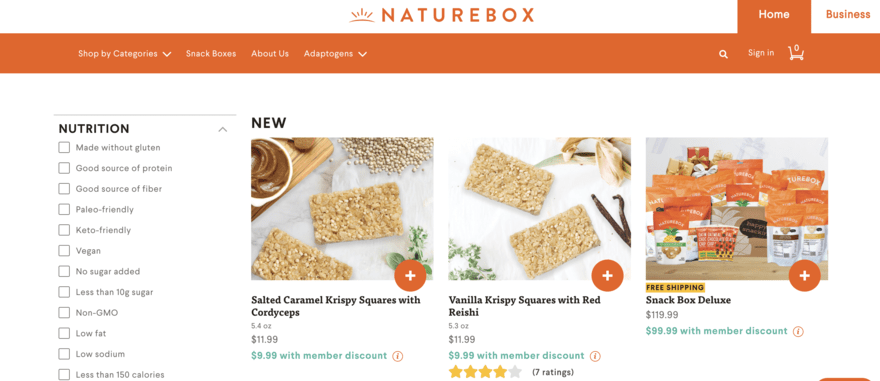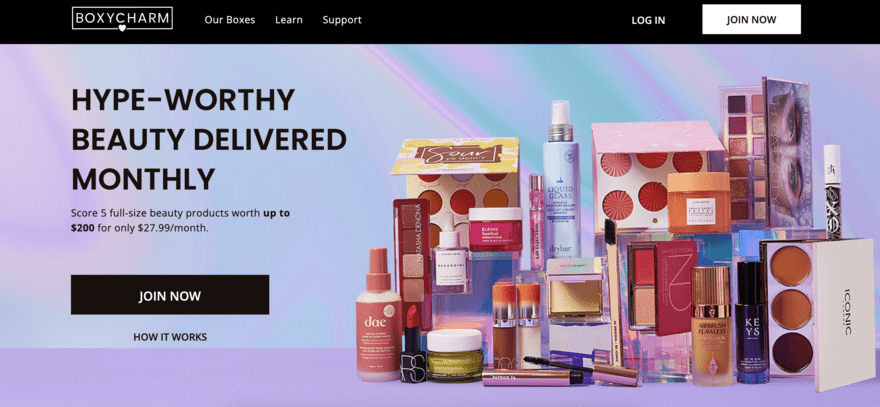Subscription Ecommerce: A Beginner’s Guide
If you click to purchase a product or service based on our independent recommendations and impartial reviews, we may receive a commission. Learn more
Subscription ecommerce models have grown in popularity in recent years and are only getting bigger.
With over 50%* of online shoppers admitting to being signed up to a subscription service, they’re no longer a “nice to have” for online businesses. Instead, they’re a key way of increasing custom and revenue.
Knowing where to start with subscription ecommerce can be tricky. There are various model types and you need to work out what will work best for both your business and your customers.
In this guide, we’ll take you through everything you need to know about subscription ecommerce so that you can implement it into your own online business.
What is Subscription Ecommerce?
Put simply, subscription ecommerce is an ecommerce business model where customers sign-up to receive your products and services regularly.
The main benefits of the model? Subscription ecommerce is a great way of nurturing customer relationships, increasing sales, and boosting a customer’s lifetime value.
Different Subscription Ecommerce Models
There are different types of subscription ecommerce models that you can choose from.
Working out which one is right for your business depends on a variety of factors, including your product or service offering, your audience, your budget, and your resources.
#1. Replenishment
A replenishment subscription model allows customers to buy items, usually perishable, on a regular basis.
This model “tops up” a customer’s stock of products that they use frequently, allowing them to save time and money by having their items delivered straight to them at a determined time interval.
Replenishment subscription models work for products that need to be replenished after a certain amount of time, such as toiletries and beauty products or food and supplements.
The good news is that a replenishment subscription model usually has a high customer retention rate. After all, once you’ve made a customer’s life easier, why would they want to cancel and make it harder?!
However, you’ll have to offer your products at a slightly discounted rate to make the subscription model the best value option for customers.
#2. Curation
A curation subscription model sees businesses provide customers with a selection of products based on their tastes and preferences.
The most common type of curation subscription is subscription boxes. Subscription boxes provide customers with a selection of products to try out and enjoy every month.
While customers usually don’t select the individual products themselves, they’re selected based on the preferences of the subscribed customers.
This is a great way of opening up a wider product range to customers, and it can be incredibly profitable! That being said, you’ll need to be willing to initially invest in your marketing to attract customers to your new curated subscription service.
As a result of the COVID-19 pandemic, when customers needed products to be delivered straight to them, more businesses than ever are now offering subscription boxes.
#3. Access
An access subscription model sees customers pay a fee to access your products, usually at dramatically reduced or wholesale prices.
The most well-known example of an access model is Costco where customers pay to be a member and they can then access wholesale quantities and prices.
You need to ensure that if you’re opting for an access mode, the discounts and perks on offer to customers make the initial subscription fee worthwhile.
Benefits of Subscription Ecommerce
Setting up a subscription ecommerce model comes with a range of benefits:
- Recurring revenue – A subscription model can result in regular cash flow for your business and boost your revenue and profits. The money you make from a subscription service is relatively predictable since you can look ahead and see how many customers are signed up for your service, allowing you to predict and plan for the future.
- Higher customer lifetime value – Subscription models are a great way of increasing the lifetime value of a customer. You can be confident that a customer will stick around for longer if they’re signed up for your subscription model. And, the longer you keep providing them with value via their subscription, the longer they’ll stay your customer.
- Better stock forecasting – Getting your stock and inventory forecasting wrong can cost your business thousands. If you understock and sell out too quickly, customers will go elsewhere, but if you overstock, you’ll be left out of pocket with surplus goods. A subscription model allows you to accurately predict how much of a product will be needed within a certain period, meaning you can predict and purchase the right amount from the get-go.
Subscription Ecommerce Examples
Below are three of our favorite subscription ecommerce examples to help inspire you.
Dollar Shave Club

Dollar Shave Club is a great example of a replenishment ecommerce subscription. They provide personal grooming items, such as razors and shaving cream, to customers via a subscription model.
Dollar Shave Club excels because it allows customers to select their delivery dates, skip a delivery, and cancel at any time. This makes the customer feel in control.
Dollar Shave Club is targeted at men and it positions its products as cost-effective and time-saving, which are two of its target audience’s main concerns.
Nature Box

Nature Box provides healthy and wellness-centric sweet and savory snacks, and it operates on an access-based ecommerce subscription model.
Users sign up to become a Nature Box member, giving them access to Nature Box’s unique products, special offers, and member prices.
Nature Box also provides members with $72 in credit annually to spend on the store, as well as a guarantee that their savings will outweigh their subscription cost, otherwise they can get their money back. Pretty generous!
What we like about Nature Box is that it presents its products as unique and effective, encouraging people to sign up for membership since they won’t be able to find the items elsewhere.
Find Out More
If you’re inspired by Nature Box and want to create your own membership website, check out our expert guide full of tips and expert insight.
Boxy Charm

Boxy Charm is a beauty brand that provides a curated subscription box service for its customers.
Customers sign up for the subscription before taking a quiz to determine their product preferences. Each month users have the option to customize their beauty box, adding and removing items to suit their preferences.
Boxy Charm guarantees that all products will be full size and every box is usually valued at around $200 (not bad considering the subscription fee is $27.99).
Boxy Charm positions itself as a way for beauty lovers to try out new and trending products without having to commit to paying full price for the individual items.
Subscription Ecommerce Top Tips
If you’re looking to start a subscription ecommerce business model, here are our expert top tips:
- Find your niche – What makes your business different from other subscription service providers? If you want users to commit to your subscription or become a member of your website, you need to have a USP (Unique Selling Point) that makes you stand out from the crowd.
- Understand what your audience wants – Understanding your audience is crucial if you want your subscription model to be a success. It’s no use offering them a membership website if they would prefer access to a monthly subscription box.
- Source your products first – If you’re offering users access to specific products, via a subscription or replenishment box, then make sure you source your products first. You don’t want to find yourself unable to fulfill a customer’s order after they’ve subscribed to your service.
More Information:
We recommend checking out our list of the best website builders to help you get started since plenty of them offer built-in tools for membership areas and subscription models.
Subscription Ecommerce: Summary
We know that launching a new subscription ecommerce venture can seem daunting and there are a lot of variables that’ll impact its success, but the tips and information laid out in this article will guide you through the process from start to finish.
While this article provides you with the perfect foundation to get started, remember that to keep your ecommerce subscription business running long into the future, you’ll need to maintain a good line of communication with your customers to ensure you’re constantly adding value and support.
Let us know how you get on in the comments section!
*Intro Source: https://www.invespcro.com/blog/e-commerce-subscription-model/


Leave a comment